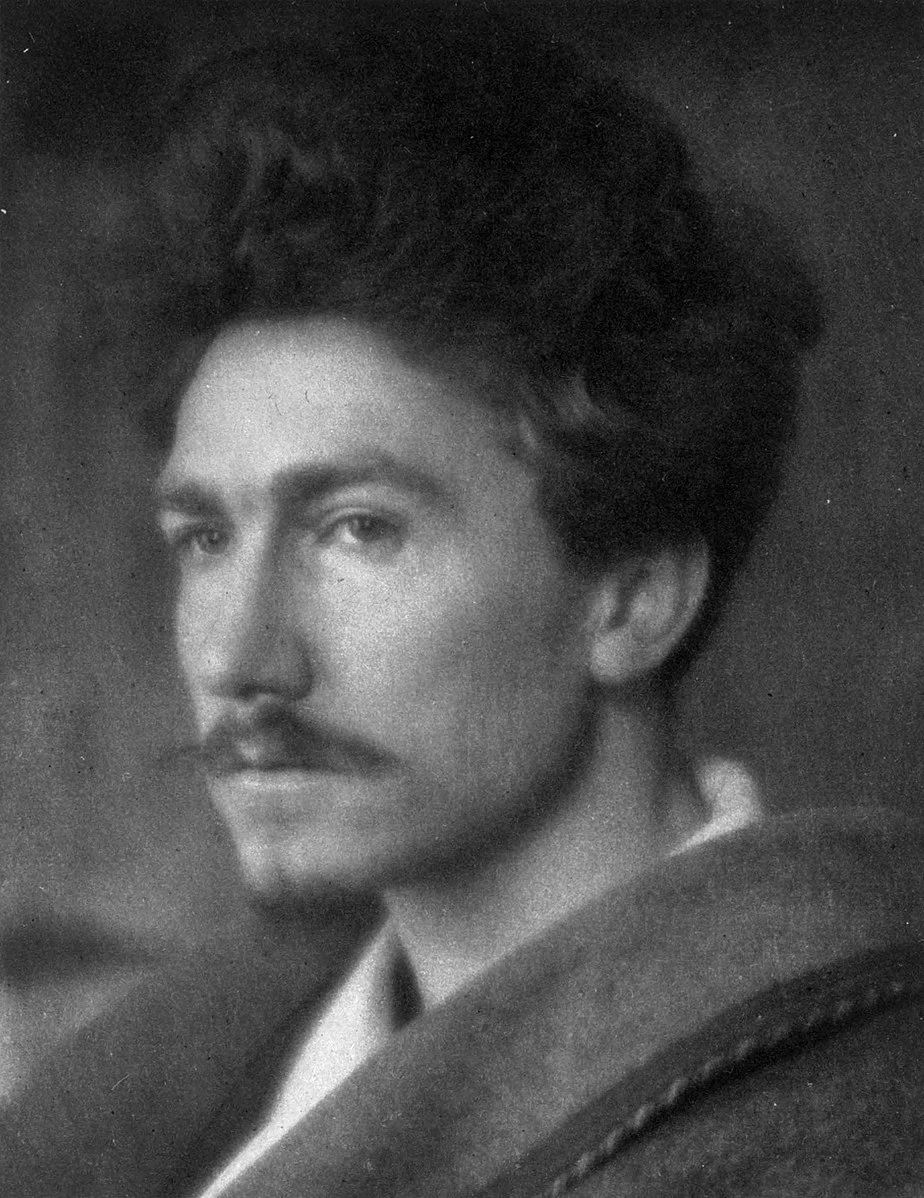>Ezra Weston Loomis Pound (30 October 1885 – 1 November 1972) was an expatriate American poet, critic, and a major figure in the early modernist poetry movement, His works include Ripostes (1912), Hugh Selwyn Mauberley (1920), and his 800-page epic poem, The Cantos (c. 1917–1962).[1]
>Pound's contribution to poetry began in the early 20th century with his role in developing Imagism, a movement stressing precision and economy of language. Working in London as foreign editor of several American literary magazines, he helped discover and shape the work of contemporaries such as T. S. Eliot, Ernest Hemingway, and James Joyce. He was responsible for the 1914 serialization of Joyce's A Portrait of the Artist as a Young Man, the 1915 publication of Eliot's "The Love Song of J. Alfred Prufrock", and the serialization from 1918 of Joyce's Ulysses. Hemingway wrote in 1932 that, for poets born in the late 19th or early 20th century, not to be influenced by Pound would be "like passing through a great blizzard and not feeling its cold."[a]
Quite the interesting figure here, its odd that he is rarely discussed in English classes in the U.S. when he's so influential. Maybe he's mentioned but not pushed, you'd think an American who did so much would be highly lauded by history books.
>Angered by the carnage of World War I, Pound blamed the war on finance capitalism, which he called "usury".[3] He moved to Italy in 1924 and through the 1930s and 1940s promoted an economic theory known as social credit, wrote for publications owned by the British fascist Sir Oswald Mosley, embraced Benito Mussolini's fascism, and expressed support for Adolf Hitler. During World War II and the Holocaust in Italy, he made hundreds of paid radio broadcasts for the Italian government, including in German-occupied Italy, attacking the United States, Franklin D. Roosevelt, Great Britain, international finance, munitions makers and mongers, and Jews, among others, as causes, abettors and prolongers of the world war, as a result of which he was arrested in 1945 by American forces in Italy on charges of treason. He spent months in a U.S. military camp in Pisa, including three weeks in an outdoor steel cage. Deemed unfit to stand trial, he was incarcerated in St. Elizabeths psychiatric hospital in Washington, D.C., for over 12 years.
Oh.
>While in St. Elizabeths, Pound would often decline to talk to psychiatrists with names he deemed Jewish (he called psychiatrists "kikiatrists"),[370] and he apparently told Charles Olson: "I was a Zionist in Italy, but now I'm for pogroms, after what I've experienced in here (SLiz)."[371] He advised visitors to read the Protocols of the Elders of Zion, and he referred to any visitor he happened not to like as Jewish.[372] In November 1953 he wrote to Olivia Rossetti Agresti that Hitler was "bit by dirty Jew mania for World Domination, as yu used to point out/ this WORST of German diseases was got from yr/ idiolized and filthy biblical bastards. Adolf clear on the baccilus of kikism/ that is on nearly all the other poisons.[sic] but failed to get a vaccine against that.
Frickin lol.
I have The Cantos but I haven't even tried to read it yet, people much more well read than I get filtered by it apparently so I'm a bit intimidated.








Jump in the discussion.
No email address required.
https://en.wikiquote.org/wiki/H._L._Mencken
https://en.wikipedia.org/wiki/H._L._Mencken#Anglo-Saxons
Jews
In the 1930 edition of Treatise on the Gods, Mencken wrote:
The Jews could be put down very plausibly as the most unpleasant race ever heard of. As commonly encountered, they lack many of the qualities that mark the civilized man: courage, dignity, incorruptibility, ease, confidence. They have vanity without pride, voluptuousness without taste, and learning without wisdom. Their fortitude, such as it is, is wasted upon puerile objects, and their charity is mainly a form of display.[47]
That passage was removed from subsequent editions at his express direction.[48]
Chaz Bufe, an admirer of Mencken, wrote that Mencken's various anti-Semitic statements should be understood in the context that Mencken made bombastic and over-the-top denunciations of almost any national, religious, and ethnic group. That said, Bufe still wrote that some of Mencken's statements were "odious", such as his claim in his 1918 introduction to Nietzsche's The Anti-Christ that "The case against the Jews is long and darning; it would justify ten thousand times as many pogroms as now go on in the world".[49]
Author Gore Vidal later deflected claims of anti-Semitism against Mencken:
Far from being an anti-Semite, Mencken was one of the first journ*lists to denounce the persecution of the Jews in Germany at a time when The New York Times, say, was notoriously reticent. On November 27, 1938, Mencken writes (The Baltimore Sun), "It is to be hoped that the poor Jews now being robbed and mauled in Germany will not take too seriously the plans of various politicians to rescue them." He then reviews the various schemes to rescue the Jews from the Nazis.[50]
As Germany gradually conquered Europe, Mencken attacked Roosevelt for refusing to admit Jewish refugees into the United States and called for their wholesale admission:
There is only one way to help the fugitives, and that is to find places for them in a country in which they can really live. Why shouldn't the United States take in a couple hundred thousand of them, or even all of them?[50]
Jump in the discussion.
No email address required.
Heckin cute and valid feminist!
NOOOOOOOOOOO!
Jump in the discussion.
No email address required.
More options
Context
Somethings going on in my head again... !nooticers
Jump in the discussion.
No email address required.
More options
Context
Dude was esstremely based
Jump in the discussion.
No email address required.
More options
Context
https://archive.org/details/in.ernet.dli.2015.58135
He thought "Treatise on the Gods" was his best book. I've read it, it's pretty awesome.
I can quote passages out of "In Defense of Women" (great OG troll title, btw) by memory:
https://www.gutenberg.org/files/1270/1270-h/1270-h.htm
"All I need do here is to recall the fact that, in the United States, alone among the great nations of history, there is a right way to think and a wrong way to think in everything—not only in theology, or politics, or economics, but in the most trivial matters of everyday life. Thus, in the average American city the citizen who, in the face of an organized public clamour (usually managed by interested parties) for the erection of an equestrian statue of Susan B. Anthony, the apostle of woman suffrage, in front of the chief railway station, or the purchase of a dozen leopards for the municipal zoo, or the dispatch of an invitation to the Structural Iron Workers' Union to hold its next annual convention in the town Symphony Hall—the citizen who, for any logical reason, opposes such a proposal—on the ground, say, that Miss Anthony never mounted a horse in her life, or that a dozen leopards would be less useful than a gallows to hang the City Council, or that the Structural Iron Workers would spit all over the floor of Symphony Hall and knock down the busts of Bach, Beethoven and Brahms—this citizen is commonly denounced as an anarchist and a public enemy. It is not only erroneous to think thus; it has come to be immoral. And many other planes, high and low. For an American to question any of the articles of fundamental faith cherished by the majority is for him to run grave risks of social disaster. The old English offence of "imagining the King's death" has been formally revived by the American courts, and hundreds of men and women are in jail for committing it, and it has been so enormously extended that, in some parts of the country at least, it now embraces such remote acts as believing that the negroes should have equality before the law, and speaking the language of countries recently at war with the Republic, and conveying to a private friend a formula for making synthetic gin."
Jump in the discussion.
No email address required.
More options
Context
More options
Context